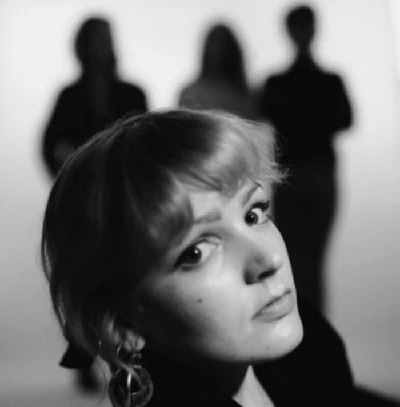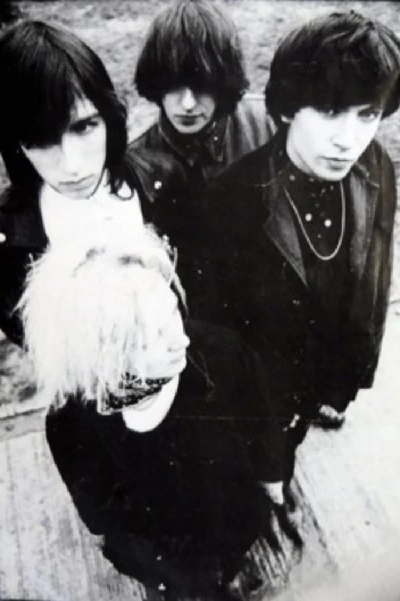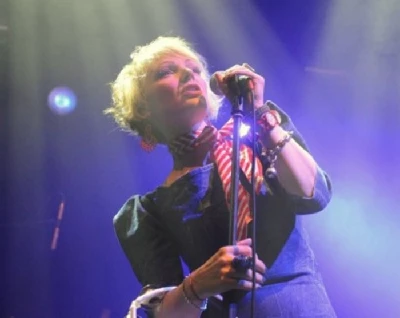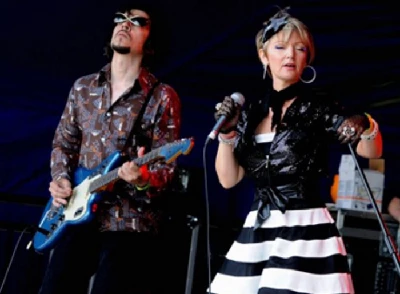Miscellaneous
-
Interview
published: 9 /
10 /
2010
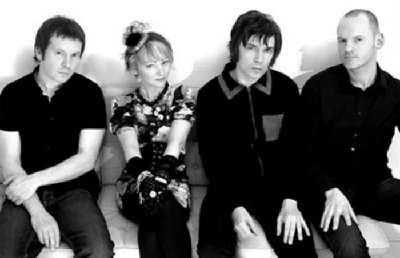
Influential punk/pop group the Primitives recently reformed after a nearly twenty year absence. Anthony Strutt speaks to singer Tracy Tracy and guitarist Paul Court about their late 80s chart success and getting back together
Article
The Primitives were one of the best known pop/punk acts of the late 80s and early 90s.
Formed in 1985 in Coventry, they set up up their own Lazy Records and had initial indie chart success with singles such as 'Thru the Flowers', 'Really Stupid' and 'Stop Killing Me'. In late 1987, shortly after Morrissey had named them one of his favourite groups, the Primitives signed to major label RCA when it bought over Lazy Records.
Early 1988 saw the Primitives reach national fame and plunge into the Top 5 with the classic single 'Crash'. Their debut album, 'Lovely', also went into the Top 10. The group would release several more singles including 'Out of Reach' and 'Sick of It' and another two albums, 'Pure'(1989) and 'Galore' before splitting up shortly after the release of 'Galore' in 1992.
Steve Dullahan, the group's first bassist, died in 2009 and the band reformed shortly afterwards with original members, singer Tracy Tracy, guitarist Paul Court and drummer Tig Williams, all on board.
Pennyblackmusic spoke to both Tracy Tracy and Paul Court before their soundcheck for a headline gig at the Reverence Festival at the ICA in London.
PB: A bit of history to start. You originally formed in 1985, Paul. Were you in any groups before then?
PC: When I was young, I was in various bedroom bands around town in Coventry. I decided to retire when I was eighteen and then I got into the Primitives Mark 1 when I was about twenty I suppose.
PB: Tracy wasn't part of the band at first and originally you had another girl fronting the band called Keiron McDermott, didn't you?
PC: Keiron was a boy. That was about a year. We went into a recording studio with him and we worked out then that it wasn't going to work out with him. The stuff that we were doing with him we were pretty much making up as we went along and seeing what he could add to it. We tried him in the studio, and it didn't work out, so we started to become more structured in our songwriting and to look for someone else.
PB: Then Tracy came along.
TT: Yeah.
PB: How did you join the band, Tracy? Was it the traditional way and through an advert in a shop window?
TT: It was actually in an old library in Coventry that isn't there anymore. It has been pulled down. There was a piece of paper on a board saying the name of the group and that they were looking for a male singer. They were influenced by the same bands that I was interested in and listened too, so I thought that I would go along anyway and see what happened and it just went from there really.
PB: How long was it before you toured and started to release material?
PC: We did our first gig at The Clarendon in Hammersmith in London and a small club underneath it when Tracy had been in the band for about a month. We did some recording down there at the same time, which became most of our first release, the EP 'Thru the Flowers'. We were gigging straight away. We didn't really play Coventry much. It was mainly London.
Pb. Your first few singles were on your own label Lazy Records. Who else was on that label?
PC: My Bloody Valentine were on it. They did a few EPs on it.
PB: Was it a local label?
PC: No, it was London based. Our manager lived down there, although at the time we were still in Coventry.
TT: He had an office down there and it went from there really.
PC: It became eventually part of RCA, an offshoot of that really.
PB: The original sound of the band, if I can describe, it was one of buzzsaw guitars, gritty psychedelia and , while they became clearer, initially fuzzy vocals. Your image was also quite scruffy at first. Were you trying to update a 60s sound for the 1980s?
PC: Yeah, I suppose so. It was the only way we really could do things though.
PB: I interviewed William Reid of the Jesus and Mary Chain, who told me their sound came out of a faulty effects peddle.
PC: It was the same sort of thing for us. We filtered in stuff. We thought we would write pop songs, but we couldn't play so well so we thought we would just make some noise and disguise our playing with a racket and that is basically how it worked.
PB: Morrissey introduced you on stage last time you were in London and played the Scala. Was that an honour?
TT: Yes, it was.
PC: He took time out of his evening to come and introduce us.
TT: He came along to the gig, was out the back there and we had a few nice words with him. We talked about the country. It was nice.
PB: Are you still friends with him?
TT: I go out with him on a regular basic. No(Laughs).
PC We go out to McDonalds (Laughs).
PB: The song you are most famous for is 'Crash'. When did you write it?
PC. We wrote that very early on and then we dropped it from the set. We had a lot of songs like it, three chord style Ramones numbers, and then our producer Paul Sampson said it was a good song and that we should resurrect it. We recorded it a while before Lazy became part of RCA.
PB: Did you expect it to be so big as it became?
TT: I think when we recorded it it did stand out. It had all those lovely elements to it, the melody, the three chords. I always thought it was special. I just had a feeling inside. I didn't think it would get to where it did though.
PB: You were on 'Top of the Pops' quite a lot. How did you enjoy playing that?
TT: We did it a few times, didn't we? It was strange after watching it on TV. Watching it and living it were very different experiences.
PB: Did you have to lip sync?
TT: Yes, we did.
PB; When you signed to RCA your image changed. You all cut your hair. Was that someting enforced by the label?
TT: No, it was all very naive. Things just followed through there.
PJ: On the day that we recorded 'Crash' I got up washed my hair, which was a mop top, and I greased it all back. Steve lent me his leather jacket and that was our image from then on.
TT: The record company had no say really, but we used that image after that in promo videos and promo pictures.
PB: Once you got to RCA was success all that you hoped that it would be or were there sides to it that you didn't like?
PC: There was plenty of it that we didn't like, all the usual things really.
PB: Did that include touring?
PC: Not that. You have got a record to release that isn't coming out for six months. When you are on an indie the turn around is much quicker.
TT: Major labels have their way of doing things. With indie labels they are usually much faster way at getting things done and there is a lot less pre-planning.
PB: Why did you break up when you did. Had you said everything you had to say?
TT: We weren't happy with the manager and for various reasons it wasn't feeling right anymore. It was a good time to end.
PB: (To Tracy) After that I believe you did disco track.
TT: Yeah, I did a bit here and there and then I lived aboard for a while, and I became a qualified hairdresser with Toni and Guy.
On the music side of things I had friends that were DJs in Birmingham. I think the track you are talking about was 'Pink Bomb'. I guested on a few things. I did stuff with Stevie D as well.
PB:(to Paul)You had Joypop.
PC: That was my art project.(Paul also had a band called Starpower whom released two seven inch singles-AS). I'm not doing that anymore. It lasted about seven years.
PB: The reunion happened as a tribute to your bass player Steve who had died.
PC: We all met up again at his funeral, so we started playing again and did a secret show at the Buffalo Bar in London. It springboarded from there and it ended up with a tour in April. There has been bits and bobs here and there.
PB: And there are four new songs, aren't there?
PC: Yeah, two covers and two new songs. There will be possibly an EP next year. It is just something to say what we have been doing in the last year. There might not be anything after that, but there will hopefully be the EP and also a download.
PB: There is no www.primitives.com.
PC: No, there are lots of fan sites like the 'Crash' site, which is run by an American guy.
PB: There are at least eight Primitives compilations out there. Is there any chance of the three albums being remastered?
PC: That is out of our hands. It is what BMG who have the rights want to do with them.
PB: What will you be doing next?
TT: We did Indietracks a few weeks back, have a few more dates in Spain and maybe some more might come along next year. It is whatever comes along really.
PC: We might also being doing some more shows in December and maybe some dates in America next year.
PB: Thank you.
Picture Gallery:-
